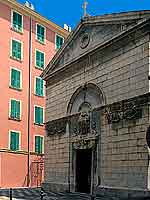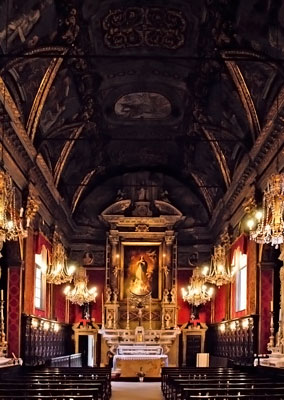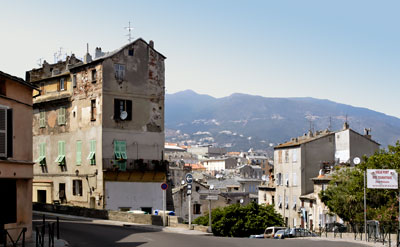Bastia, Corsica
Monday, July 14th
As the crow flies, Bastia is 13 km due east of St. Florent. But the Star Clipper can't travel overland, and was obligated to sail north and around the tip of Cap Corse, a distance of about 100 km. The pace must have been quite leisurely, because we didn't drop anchor in Bastia until 17 hours later. This is the nature of cruise ships. So many factors determine arrival and departure times, including allowing for unexpected adverse weather at sea. At night, the ship may spend a lot of time tacking, going in circles, or just dawdling. Arrival and departure times are fixed. Arriving early or departing late is simply not permitted. Nor can a ship make an unscheduled stop just because another port is unavailable due to rough seas.
We dropped anchor near Bastia about 11AM. Originally, the schedule had us in Elba today and Bastia tomorrow. One of the crew members told me that the destinations were reversed so the ship would not have to travel to Italy, back to France and on again to Italy. Too bad. From the passengers point of view, it would have been much more interesting to spend Bastille Day in Italy.
Bastille Day. Parades and festivities? Nope. The town was deserted and shops were closed. A few restaurants remained open and, of course, the tee shirt vendors. But otherwise, Bastia was devoid of life. How often are the sounds of a city so silent that you can hear birds chirping and doves cooing? Especially in a region where a quarter of Corsica's population lives.
We walked around anyway, past Saint-Jean Baptiste, the largest church in Corsica, whose two towers loom over the town and
port. Further on is the Place de l'Hôtel de Ville (also known as the Place du Marché), a small square that usually has a morning
market. It is rather pleasant, with plane trees surrounding a few shops and a chubby girl fountain.
Higher up the hill were the Municipal Theater, the Palais de Justice and the Chapelle Saint Charles...all quiet, all closed. Much of the Terra Vecchia consists of old, dilapidated houses. Laundry hung from balconies and windows. The narrow streets were littered and reeked of urine and feces. By far, Bastia was the dirtiest town we've visited in all of Europe.
After lunch at La Columba, facing the old port, we walked to the Nouveau Port. This is where the huge ferries arrive from
Sardinia, Italy and other French ports. Alongside the quai is the enormous Place Saint-Nicolas which normally bustles with activity.
The surrounding cafes are popular with both visitors and residents alike. But today it was still: few ferries, few people.
Napoleon, muscular and toga-clad, seemed lonely on his pedestal.
We returned to the port by way of the Jardin Romieu, terraced gardens created in the 18th century, which provide a peaceful walk through pines, laurels and palms. After a leisurely walk on the jetties and once more around the port, we boarded the tender and returned to the ship.
| Oratorio | Oratorio |

|

|
